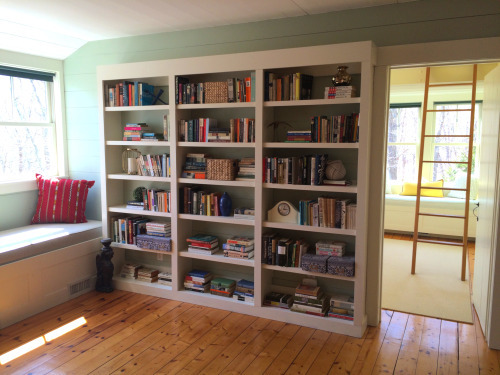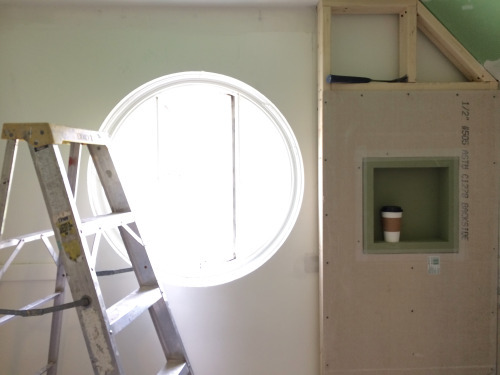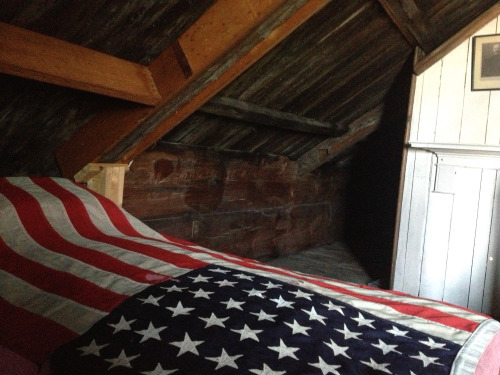Nina MacLaughlin's Blog, page 15
April 22, 2016
I had the chance this morning to have a look at some of the...

I had the chance this morning to have a look at some of the bookshelves I built for my dad a couple years ago. The house is being sold, so it might be the last time I’ll see them.
April 19, 2016
The house we’re working on in Cambridge has a Royal Tenenbaums...

The house we’re working on in Cambridge has a Royal Tenenbaums feel to it. Grand in a
certain nonchalant way, with art and rugs that suggest travel and a definitive
aesthetic, charming and well-framed
photographs of grandchildren, weddings, days on the beach when the kids were
small and curly-haired and wore striped towels around their shoulders. It is a
large house in a neighborhood with other large houses. You could have a good
game of three-v-three soccer in the backyard.
We wind our way up a creaking back stair to the third floor
to re-do a bathroom. The bedrooms up there, with tired floral wallpaper and
slanted ceilings, feel like rooms that adult children would return to during
some sort of nervous collapse. Lodged in time, nest-like, the two rooms up
there are tucked above and feel far removed from the human scene of the public
part of the house below. These are rooms not for children, not bright lit and
airy, looking out over the lawn, giving the feel of fresh potential upon every arrival of the morning sun. Nor are they atticky in that secret, ghosty way that is also right for kids.
These are rooms to pull the shades, stare at the seams of the wallpaper, and try
to unburden yourself of frights and pain, rooms to reassemble yourself after time has detached
you from a reality that’s understandable. These are rooms to disappear for a
little while. And, when we’re done, there’ll be a nice place also to take a
bath.
April 18, 2016
I was invited to be a guest speaker at an event recently and
early in the evening a woman approached...
I was invited to be a guest speaker at an event recently and
early in the evening a woman approached me and said she was looking forward to
my talk, and that she was going to give a copy of the book to her brother, a
carpenter. I’d put her in her late fifties, a white woman in
business-casual with hair like straw.
“He’ll probably roll his eyes though.”
The matter-of-factness with which she said it suggested she
was speaking also for herself. Nothing in her tone was apologetic or condemning
of this reaction.
“Why would he roll his eyes?” I asked, warm as could be, trying
to sound, above all, curious. I was a guest, after all, and wanted to be polite,
and also wanted to err on the side of giving her the benefit of the doubt.
“Does he not think women should be in the trades?” I said it as though this was
a completely reasonable position to take, an unsurprising and warranted view.
Which reminded me that I am a coward.
She told me then about a picket line her brother had been
on, and how a woman carpenter showed up wearing pink hot pants and how
disgusted her brother had been. She described this woman to me, how she had
been smoking and had brought her kid with her and she was wearing these hot
pants, and she didn’t have the figure for them, she was too old for hot pants,
she was the sort of woman who should not have
been wearing pink hot pants. And the amount of times she said the words hot pants began to feel somehow absurd,
almost frightening, in a Twin Peaks sort
of way. “The hot pants went up to here,” she said as she twisted her hips to
show me her rear, her hand like a plate at the base of her ass in her pilling
navy trousers. “Pink hot pants.” And she said again how the woman “didn’t have
the figure for it.” How she was “too old.” And she repeated that she was
smoking and had her kid with her and how her brother wanted nothing to do with
her, that she’d tried talking to him and he’d just walked away. There was such
disgust in her voice.
Usually I can figure out what to say to people. Here, standing
by a podium in a conference center in a fancy Boston suburb with plates of
bacon-wrapped scallops and crab cakes and sesame chicken fingers being passed
around and fading spring light filtering through the slats on the windows as
the sun set outside, I had no idea what to say. Undone by how many times she’d
used the words hot pants. Undone by
the disgust in her voice.
“You know, sometimes I’ll try to help him with projects,”
she went on. “And he’ll tell me, go away,
you don’t know what you’re talking about. But then later he’ll admit, maybe that wasn’t so bad a thought. Well,
anyway, I’m looking forward to your talk.” She turned and walked away and back
into the crowd.
It threw me off for the rest of the evening. As I did my
talk about the book to the gathered crowd as they sipped their wine and fumbled
with their cocktail napkins, all I could think of was this woman’s brother
rolling his eyes –
he was a ghost in the audience, standing at the back of the room, thick arms
folded across his chest, heavy tool belt sagging at his waist, shaking his head
at me. And there was the woman in the hot pants, too, and good for you, lady,
wearing what you want on the picket line. She looked great, with wrinkled
sagging flesh and fire in her eyes. What was it that shook me so? At first I
thought it was how it sounded like this man hated women. But more so, more so,
it was the way it sounded like this woman did.
April 13, 2016
It’s late notice, but in case any of you nearby find yourself...

It’s late notice, but in case any of you nearby find yourself with an open morning on Thursday – I’m part of a panel discussion on being a “gutsy communicator” as part of the Spring Empowerment Conference put on by the Graduate Women of MIT. It’s free and open to the public, and I think it might be pretty neat.
Someone wrote to me last year and said that reading Hammer
Head was like being told his own story to...
Someone wrote to me last year and said that reading Hammer
Head was like being told his own story to himself, and it raised the question
for him as to whether there’s a particular set of books out there that together
combine to assemble a sort of biography of his life. I loved this idea, and it
made me realize that maybe this is part of why we read, in some ways in search
of our own stories told back to us.
He’d left his job in the business of words to learn
carpentry from scratch; we’ve both been at it for seven years. Recently we
talked about the experience of approaching something wholly new as thirty-ish
year olds. Can you remember when you learned to tie your shoes? Write cursive?
Drive? The thrill of competency, of being initiated into some new
understanding, of some new knowing how. What a thing to be able again to
experience that kidlike thrill with all its frustrations and fuck-ups and
getting it wrong until you finally get it right. What a thing to have proven to
yourself that you can start blank, fresh as a kid who’s only worn velcro, and
continue to learn and learn and learn. Maybe it’s the spring, the detonations
of color, the buds like light green shadows on the trees, but things feel fresh –
it’s daunting some days, how much there is to know, how little time, how slow I
am to learn. Other days, exciting, and scary, too. These fresh starts. New knowings. The dazzling and difficult experience
of the unfamiliar becoming familiar.
April 4, 2016
Some years ago at the end of summer, I helped make clam chowder...

Some years ago at the end of summer, I helped make clam chowder with two men, writers both, who happen also
to be confident in the kitchen. I let them jockey with each other over
technique and positions at the stove, and was tasked with scrubbing the clams, of
stripping the clenched shells of grit and mud. Humble job. At first I was aware
of the men behind me, heard the thunk of knifeblades through potatoes, of milk
getting glugged into the pot, of onions in hot oil, of the sizzle of fat
being rendered from flesh. The flashier jobs of the evening’s meal.
I could feel the energy of these two bodies behind me, and listened
as they talked. But as I scrubbed, that action faded against the scritching of
brush on shell, the cold tap water running over my hands, the specks of mud
that flecked the private parts of my wrist where the veins run blue and close
to the skin. My hips leaned into the edge of the sink and I removed from the
clams the residue of ocean murk. I scrubbed and scrubbed, held each clam in my
palm, and it began to feel as though I was preparing them for a funeral. Ritual
cleansing, sacred, grave. As clean as I could get them as a way of honoring
them for giving their lives to the meal. Thanks, small friends, I thought at
them as I placed them in a bowl one by one, cleaned and readied for their fate.
In the middle of the state last week, at a botanic garden on
a hill, a field was filled with daffodils, yellow horns blasting news of
spring. It was close to seventy degrees and the breeze was soft. Around the paths
and beds, new green, swollen buds, velvety petals, as plants emerged from the
earth with thrilling names: Siberian squill, Allegheny spurge, pink maiden. Swoon.
But we’ve slipped backwards into winter; it’s been snowing
all day long. I’m imagining spreading a quilt over all the flowers to protect
them from the white funeral shroud that’s been falling, white like the chowder
made that night. How to keep the warmth in? To keep them moist and ready, to maintain
their momentum despite the back-in-timeness of the weather? Did we see them in
their first and final days? I hope not. I trust the flowers aren’t so fragile,
that all the new stalks and tiny pressing buds know how to keep themselves
warm, to protect themselves while they wait a few more days as spring regroups,
tries harder.
The clams, scrubbed clean, opened in the steam, pouring
forth their salted juice. The buds and flowers fold into themselves, but will
spread again once the sun washes them in warmth to bring about another tender,
tentative opening and entering. The thing that marks each season’s shift:
eagerness. Eagerness and hunger, deep and almost frightening.
March 25, 2016
Away from Cambridge for the weekend, glass, wood, and water, by...

Away from Cambridge for the weekend, glass, wood, and water, by the Slocum River, a quick dose of country before a return to the carpentry work next week. The lights hang like full moons and the silence at night here collides with the depth of darkness in a way that does something right for the mind.
March 22, 2016
Over a coffee on Sunday morning, a young woman and I talked
about our bodies. Twenty-four, she’s...
Over a coffee on Sunday morning, a young woman and I talked
about our bodies. Twenty-four, she’s been working as a carpenter in the city
for the last nine months, and reached out to talk to me about the work, about
being a woman in the work. She spoke candidly about spending time in a
treatment center for an eating disorder, about body dysmorphia, about learning
how to nourish herself, and about the ways the physical work is altering her
body and the challenge of that. It’s making her strong. It’s giving her muscles
she didn’t have before. How to be at home in this new shape? How to make sense
of this changed form?
I feel lucky to have avoided the demons that perch on the
shoulder and whisper wrong things to the brain when one looks in the mirror. I
love the combination of softness and strength, of muscles and curves. And
though I didn’t experience a destabilization in the way the work impacted my
physical self, I certainly was, for a while at first, unmoored by the way the
clothes and the work shook my sense of femininity. It’s strange and surprising how
surface things – a baggy pair of Carharts, a more defined bicep – can impact
and alter some of the most essential understandings of ourselves. And I think
it’s fair to say that these are not things that men in the trades have to
grapple with.
She talked of taking up more space, and how that feels
powerful and scary at once. She talked of learning to be strong, and how the act of it rights the energetic wrong of the patriarchy. She talked about how the work is changing her
posture, pulling her shoulders back, making her stand straighter, making her
more physically there. “I’d wanted to disappear,” she said. And I wanted to hug
her and hold her shoulder and feel her flex and tell her how incredible it is
to be strong. “Take up space,” I said, and I wish I could say it to her again
and again, to combat against the longing to be less. And I noticed I was trying
to sit as straight as I could, showing her my broad shoulders, trying to
demonstrate the small but powerful act of embodying yourself, of moving through
the world in a way that shows you own every inch you inhabit, of being as proud
of your tits as you are of your quads, your calves and ass and triceps. She
talked about how there’s a bike messenger she sees around, and how cool and
tough she looks, a badass on a bike. And I told her people likely saw her exactly
the same way. She smiled at that. I told her that the day before someone had
told me what a strong back I had, and how I loved hearing it and took it as
such a compliment. And she smiled again and said that someone had told her the
exact same thing the night before. It felt like a good thing to have in common.
March 19, 2016
"Land is a poured thing and time a surface lapping and fringeing at fastness, at a hundred hollow and..."
-
Annie Dillard
The new collection of essays by Annie Dillard, The Abundance, highlights her singular exuberance and curiousity; she strikes me as someone ultra-alive. She sings one note, but it’s two toned: a clean and brassy trumpeting to get us out of bed and the deep gong of a bell, a cosmic vibration that ripples across the universe. I reviewed the book for the Boston Globe. Give it a read.
March 17, 2016
One trick I use when I can’t sleep is to take my brain on
walks,...

One trick I use when I can’t sleep is to take my brain on
walks, to try to picture every detail of a familiar path to ease my head
towards z’s. Another is to try to remember every bed I’ve slept in. I don’t
recommend this technique because it often backfires; eventually you’ll come to
a bed you regret. That brings the bad sort of uncalm you want to avoid in the
latedark threes when the gears of perspective grind wrong. I don’t know why I
keep trying this trick.
This is a bed up in the ghosty attic of my grandmother’s
house, which no longer belongs to her, in part because she’s dead and in part
because it’s been sold away. It was a scary room to sleep, for the ghosts, for
the deep, unlit corners. The boards along the low wall there, they live in my
bedroom now, extracted by a generous contractor in charge of dismantling the
place after it was sold. They’re big boards but they’ve disappeared into the
landscape of my bedroom; I forget they’re there. But I found myself looking at
them last night. I looked at their splintery heft, holding the essence of my
favorite room of all, and I remembered that bed there, where I slept and got
brushed by ghosts in the night. Maybe some of them exist in the wood and will
emerge like genies rubbed out of bottles when I sand the boards to make a
table.



